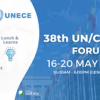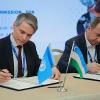News
Displaying Results 51 - 75 of 101
June 2022 has been the month of trade discussions in Geneva, first with the World Trade Organization’s (WTO) 12th Ministerial Conference (MC12) and then UNEC’s Steering Committee on Trade Capacity and Standards (SCTCS). Both looked in detail at responses to the ongoing impact of COVID-19, both…
With blockchain opening up many avenues in international trade – from facilitating financing and customs procedures to tracking due diligence and sustainability compliance – countries and companies are looking for successful practices to scale up their efforts to maximize the potential of this new…
July is a month to start enjoying the harvest of fruits and vegetables for many in Europe and the topic of reducing food loss and waste becomes very urgent. In Serbia, agriculture is an important sector of the economy, contributing around 6% of GDP. In March 2022 food production accounted for 10.4…
In view of the upcoming COP 27 of the UNFCCC, taking place in Egypt later this year, the growing threats on climate created by the textile and leather sectors call for our urgent action. If we continue down this path, we will fail by 50% to meet our 2030 emissions reduction targets, resulting in…
The UNECE region is not on track to meet the Sustainable Development Goals (SDGs) by 2030. Public procurement can be a powerful policy lever to accelerate progress. Some Governments in the UNECE region spend as much as 20 percent of GDP annually on procuring goods, services, and infrastructure.…
UNECE was engaged at the main global forum to assess and discuss progress in implementing the Sendai Framework for Disaster Risk Reduction (DRR) – the seventh session of the Global Platform for Disaster Risk Reduction (GP2022) held in Bali and online, 25-27 May 2022, fully embracing its theme: “…
Public-Private Partnerships (PPPs) have become one of the preferred mechanisms for financing the Sustainable Development Goals (SDGs) in many countries in the UNECE region. Through its approach to PPPs for the SDGs, UNECE supports countries identifying, developing and implementing infrastructure…
Products today are integrating more and more advanced technologies and sustainability criteria into their design. Soft toys with computer chips, medical devices that can assist in operations and learn from past uses, repurposed plastic bottles assembled to form a new, different product… each pose…
Standards are an integral part of society and are present in nearly everything that surrounds us on a daily basis; they shape how products are designed, produced and used. They are in all products that cross borders and can play a key role to reduce technical barriers to trade as well as integrate…
Embracing sustainable infrastructure that is green, circular, inclusive, resilient, fiscally sustainable, and of high quality is crucial for meeting the Sustainable Development Goals (SDGs). Public-Private Partnerships (PPP) can promote the development of such infrastructure projects by putting…
Recent disruptions of supply chains have exposed fragilities in the current trading system and brought to light the importance of resilience and transparency in global trade.
UNECE and other international organizations play a crucial role in supporting countries (including both the public and…
As an established convenor of standards developing organisations, UNECE encourages the integration of a gender perspective, providing practical steps for organisations to advance women’s full and effective participation in standards and standards development. With the objective of strengthening…
The textile industry is a key driver of Uzbekistan’s economy, reflected in the country’s rank as sixth largest cotton producer in the world. In 2021, the country accelerated the battle against its child and forced labor violations in cotton harvest according to a new International Labour…
Infrastructure investment is long-term in nature and can lay the foundations for sustainable development in member States. To improve the sustainability of infrastructure and public services, such investments must be aligned with the Sustainable Development Goals (SDGs) says the United Nations…
As supply chains within the garment and footwear sector are becoming increasingly complex, the need for transparency is more relevant than ever. Consumers, investors and shareholders are pressing for transparent business activities as well as the prevention and mitigation of risks in value chains,…
Global trade has been transformed repeatedly throughout history, driven by new business processes and new policies. The new advances in digitalization now promise further transformation by making it faster, more transparent, reducing risks of red tape and corruption. With the increase in global…
Over 60 participants worldwide joined the online roundtable organized by the UN Digital transformation group for Europe and Central Asia (DTG4ECA) in the framework of the Regional Forum on Sustainable Development for the UNECE region. Established in May 2020, DTG4ECA group, co-chaired by UNECE and…
The transition to a decarbonized energy sector is a critical step for keeping global warming below 2°C. To succeed, countries will need to phase out, or at least substantially limit the use of coal. While the benefits of the green transition are numerous, it will require a deep structural shift…
Strengthening value chains between Africa and the European Union (EU) is a priority objective for sustainable growth and decent jobs across the two continents. Recent market imbalances and disparities, involving supply chain disruptions and lack of attention to the social and environmental impacts…
In light of the global focus on decarbonization, which is critical to achieve the goal of keeping global warming below 2°C compared to pre-industrial levels, the energy sector must undergo profound modernization, with a focus on phasing down unabated coal extraction and use. However, to meet…
The global economy enters 2022 with new challenges. Almost two years into the Covid-19 pandemic the digitalization of transport and trade data flows is on top of the economic agenda. In response, UNECE organized its 4th workshop on trade facilitation, Single Window, and data sharing for the Western…
Trade facilitation is a key priority for Kyrgyzstan and its trading community for participation in the global and regional trading system. Under the project on “Strengthening the capacity of the Kyrgyzstan National Trade Facilitation Council to implement the WTO Trade Facilitation Agreement”, UNECE…
Complex global value chains include production facilities scattered all over the world. Sometimes, they may also involve practices of illegitimate subcontracting and undeclared informal work. In fact, their complexity and opacity make it very hard to gain accurate information about how and where…
COP26 was a positive step forward in the fight against climate change, but as the UN Secretary General pointed out in his comments: “it is not enough. We must accelerate climate action to keep alive the goal of limiting the global temperature rise to 1.5 degrees.” The compromise deal reflects the…
As all eyes turn to Glasgow where world leaders have gathered at COP26 for crucial negotiations to cut greenhouse gas (GHG) emissions and limit global warming, UNECE experts highlight how improved transparency and traceability could be part of the solution. The private sector has a vital role to…


























